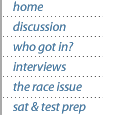 | 
The College Board's first college entrance examinations consisted of essay
examinations in English, French, German, Latin, Greek, history, mathematics,
chemistry, and physics. These exams were held the week of June 17, 1901 at 69
locations (67 in the US, 2 in Europe). Over a third of the 973 test takers
were from New York, New Jersey, and Pennsylvania, and 38% came from private
schools, 27% from public high schools, 22% from academies and endowed schools,
and 13% from "other" or unstated institutions. After the exams, the answer
books were read by experts in each subject, who rated them Excellent, Good,
Doubtful, Poor, and Very Poor. These students applied to 23 colleges or
universities, with 60% of them applying to Columbia University.

Here are some sample questions from this 1901 test:
Latin L -- Advanced Latin Composition
Friday, June 21 4:45 - 5:45 pm
1) Write the rules for the following constructions and illustrate each by
a Latin sentence :
a Two uses of the dative.
b The cases used to indicate the relations of place.
c The cases used with verbs of remembering.
d The hortatory (or jussive) subjunctive.
eThe supine in um.
2) Translate into Latin:
"I see," said Cicero, "that the faces and eyes of all of you are turned toward
me. Your good will toward me is truly pleasing to me. But I can see what is
to my advantage much more clearly than you can what is to the advantage of the
state. I shall encounter a storm of wholly undeserved odium: but it is worth
my while to be called a tyrant if only this be driven from the city and the
danger of this war be averted from you. But, since I must live with those whom
I have conquered, it is your duty to see to it that my deeds may never harm me
or mine. I have made it possible that those who are fighting for our country
in foreign lands may have a place to which they may return as victors."
3) Change 2 as far as the words "But since" into indirect discourse depending
on Cicero dixit.
Physics
A
1) A balloon contains 300 cubic meters of hydrogen, each cubic meter of which
weighs 90 grams. The material of the balloon weighs 250 kilograms. Each cubic
meter of the surrounding air weighs 7290 grams. How many kilograms in addition
to its own weight will the balloon lift?
2) Describe a method of finding the specific gravity of a solid heavier than
water; of a liquid.
B
3) A cylindric bar of uniform diameter and 1.5 meters long has a strong ring
fastened to each end and another at a distance of one meter from one end. Show
by three drawings how this rod may be used as a lever with each ring in turn
serving as a fulcrum. What weight in each case (the weight of the bar itself
being neglected) applied to one remaining ring will balance 25 kilograms at the
other?
4) A steamer is moving eastward at the rate of 240 meters per minute. A man
runs northward across her deck at the rate of 180 meters per minute. Show by a
drawing his actual path and compute his actual velocity in centimeters per
second.

home |
discussion |
who got in? |
interviews |
the race issue |
sat & test prep |
history of the sat
the screening process |
test score gap |
getting in to berkeley |
bibliography |
links |
tapes & transcripts |
press |
synopsis
FRONTLINE |
pbs online |
wgbh
 |  |